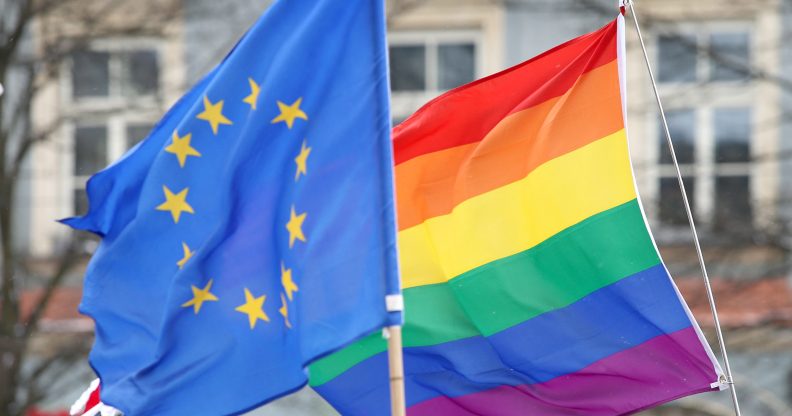Majority of LGBT+ Europeans fear holding hands in public as progress stalls and discrimination surges

Six in 10 LGBT+ Europeans said they avoid holding hands in public with their partners for fear of harassment or assault. (Damian Klamka/SOPA Images/LightRocket via Getty)
A new Europe-wide survey has found that the majority of LGBT+ Europeans fear holding hands with a partner in public, suggesting that “there has been too little real progress”.
The report by the European Union’s Fundamental Rights Agency (FRA) titled “A long way to go for LGBTI equality” surveyed 140,000 people across the EU, the UK, North Macedonia and Serbia.
It compared results with a similar survey by the same agency in 2012, and found that there had been little overall progress in fighting discrimination against LGBT+ Europeans.
Although there was a rise in the number of queer people who were open about their sexuality or gender identity most or all of the time – 52 per cent compared to 36 per cent in 2012 – other findings showed that in many ways progress was stalling, or in some cases sliding backwards.
The number of LGBT+ Europeans who had suffered discrimination in the last year was 43 per cent, up from 37 per cent in 2012.
Six in 10 respondents said they avoid holding hands in public with their partners for fear of harassment or assault, and violence remained high, with one in 10 respondents saying they had been sexually or physically assaulted in the last five years for being LGBT+.
Just half of LGBT+ students said someone among their peers or teachers supported LGBT+ people, and two in five people said they had been harassed because of their gender identity or sexuality within the last year.
A third of intersex people said that the main problem was that people see being intersex as a disease, while 62 per cent said they were not able to give informed consent before surgical procedures to modify their sex characteristics, and almost half had hormone or other medical treatments without informed consent.
More than half of trans Europeans said they had been discriminated against in the last year, compared to 39 per cent of lesbians and 32 per cent of gay men. Trans people were also least likely to trust their governments to protect their rights.
FRA Director Michael O’Flaherty said: “Too many LGBT+ people continue to live in the shadows, afraid of being ridiculed, discriminated or even attacked.
“Even though some countries have advanced LGBT+ equality, our survey findings show that overall there has been too little real progress, leaving many LGBT+ people vulnerable.
“Their job and healthcare difficulties may worsen due to COVID-19. Policymakers should take note and do more to actively promote full respect for rights of LGBT+ people.”
Helena Dalli, European Commissioner for Equality, added: “Despite the important steps forward regarding the equality of LGBT+ people in the EU in the last years, LGBT+ people still report high levels of discrimination.
“More worryingly, we have recently witnessed within the EU anti-LGBTI incidents such as attacks on Prides, the adoption of ‘LGBTI ideology-free zone’ declarations, fines for LGBTI-friendly advertisements and others.
“Everybody in the European Union should feel safe and free to be themselves.”

